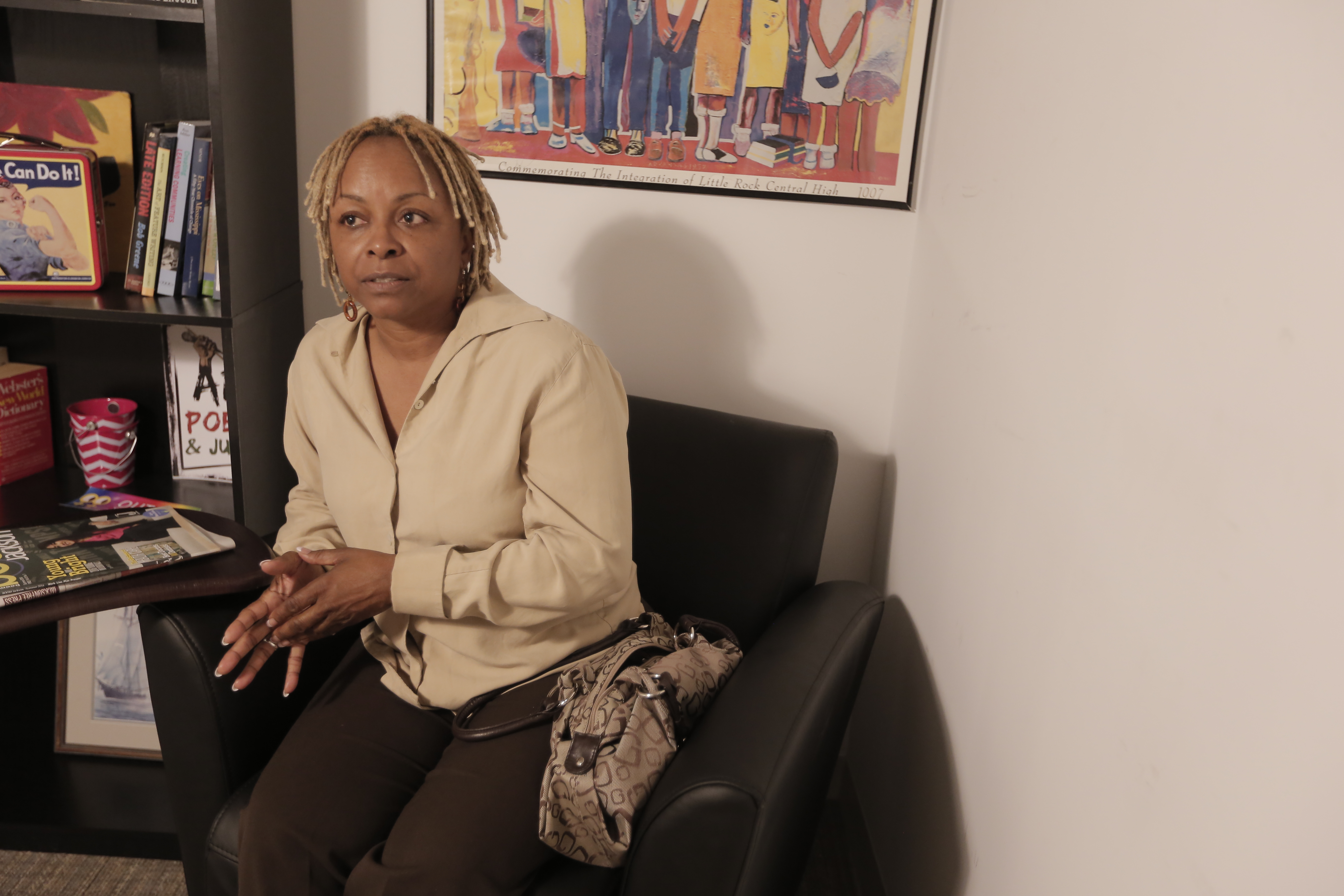After getting kicked out of her mom’s house when she chose her new husband over her, Regina Briggs met Eric, the “general” of the Black Ganster Disciples. She was a good student and never wanted to be in a gang, but soon after was in charge of cleaning, reloading and storing weapons for them. Photo by Kelsee Ford
by Asia Mangum
Living on the south side of Chicago, Regina Briggs was just 12 years old when her mother chose her new husband over her and kicked her daughter out of the house. Briggs went to the closest place she could think of, the home of Sandra, an older woman she knew, and her boyfriend. They were in their early 20s.
“I just jumped around from house to house. My friend’s moms would feed me, but then they would ask me when I was going to leave,” she says. When the adults asked her questions, she didn’t want anyone to know that she had been kicked out of her home, so she left. Still, while moving from house to house, Briggs still stayed in school.
A group of girls in the eighth grade began to attack Briggs every day even though she was only in the sixth grade. “They would punch me, slap me, push me down. One girl even twisted my arm so bad, she almost broke it,” Briggs recalled during a recent interview at the Youth Media Project. Briggs said the girls were trying to “jump her into” a gang. She did not want to join, but finally gave in.
The girls then introduced Briggs to Eric, the “general” of their gang, the Black Gangster Disciples, who would later become her boyfriend. Because of her relationship with Eric, Briggs would often sit in on private meetings involving future gang-related crimes, such as murder, robbery and possession of drugs.
“I never wanted to be in a gang,” Briggs said. “It was never something I aspired to be, because I was very smart. I was a really good student, and I did well in school until my mom married this man.”
‘I Was in Charge of Weapons’
When she was younger, Briggs wanted to be a podiatrist, but as her time in the gang progressed, she acquired a new occupation. “I was in charge of weapons. I had to clean them, prepare and reload them, and put them back into the trunk or wherever they needed them,” she said.
Unlike the other members, Briggs never participated in any gang-affiliated crimes. However, she knew what the gang members were capable of, and wanted no part of it. “They would chase you into the stairwell, and cut off your fingers if you were wearing red because our colors were black and blue,” she said. Sometimes gang members on one side of Chicago would flip over city buses that carried people from the other side of Chicago, because the north side gangs and the south side gangs were “very territorial.”
Briggs said all these crimes troubled her, but only one truly stuck with her. “This boy stole something from us (the gang), and we started looking for him,” she said. “They went to his house, but he wasn’t there. Instead, his mom and his sisters were. So they shot both the mom and the sister in the head from the window, as they sat on the couch. When police found them, the baby sister sat in between the mom and the sister, and she was just screaming.”
That was Briggs’ breaking point. She knew she had to leave.
When Briggs was 16, her older brother gave her his apartment. She lived there with her boyfriend until he was arrested for robbing a gun store. “I didn’t want to live there anymore. I didn’t want to be lonely,” she said.
She convinced her mom to put her into Job Corps in Ohio, so she left Chicago. She was able to return home for a visit after several months. When she returned to Job Corps, she was asked to take a pregnancy test. Briggs found out she was pregnant. She had to leave Job Corps, so she returned to Chicago to tell her boyfriend, Eric, but didn’t have a chance because he had died on her birthday, just three days earlier. He was stabbed in the chest.
“I came home, and I saw ribbons on the trees, and I thought, ‘Oh, he must’ve left,'” she said. “I went to his mom’s house, and all she did was hand me an envelope with pictures of him in the casket. No one knew where I had gone, so they couldn’t inform me of his death.” Briggs said Eric expressed to her that he too wanted to get out, and wanted to join the military, but it turned out that the only way he could get out was death.
Still a teenager, Briggs returned to her mother’s home because she felt very sick one day. She went into preterm labor, and gave birth to triplets, all girls. But all three of the babies were too small and undeveloped, and did not survive. Briggs said she never saw them, but named all three. “I was so depressed after losing my boyfriend and the triplets. I didn’t know what to do,” Briggs said. She suffered depression and sought out help from churches and support groups.
When she was 18, Briggs married and had her oldest son, Steven, and then gave birth to her daughter, Tyana, when she was 19. After losing the triplets, Briggs always knew she wanted three kids. Her marriage to Steven and Tyana’s father lasted less than a year. In it, she suffered both physical and mental abuse, and she and her children had to live in several shelters for battered women. Briggs later gave birth to her last child, Tyana, in 1986 and says she has raised all three of her children as a single mom.
Briggs never had an actual relationship with her mom. They didn’t settle their differences until she was in her late 20s. “She was there when I gave birth, but other than that, we never had a good mother-and-daughter relationship,” Briggs said. “We didn’t have a relationship because of all the abuse I suffered being a child. I had real serious abandoning issues, because I couldn’t understand how she could she keep him and tell me to go.”
OPP (Only Positive People)
From Chicago, Briggs and her young children moved to Milwaukee, Wis. There, she joined Americorps and found a mentor in Martin Stein. “He was somebody I could talk to, ” she said. “He was a philanthropist, and he helped people, and he paid for my kids to go to Piney Woods. He always encouraged me. He told me you don’t have to be white to be able to do things, and in my neighborhood, that’s what we thought.”
Piney Woods Country Life School is a respected private boarding school for black children in Mississippi, south of Jackson off Highway 49. When her teenage daughters would call her from Mississippi, they began to talk to her about birth control. She decided to move to Mississippi to help keep them from becoming teenage mothers like she had. She moved into an apartment in Florence, and has been in Mississippi ever since. She eventually married in 2006, but divorced in 2016. Her relationship with her mom is now a lot better than it was before.
“It took some time to forgive her, but eventually I did,” Briggs said.
Crime in Jackson isn’t all that different from up north, Briggs has found. “What’s going on in Jackson is similar to what was going on in Chicago when I was younger,” she said. “I believe Mayor (Tony) Yarber has a lot on his hands.”
Briggs, now a pharmaceutical driver, attended the mayor’s One-on-One conversation at Millsaps College. “What I would like to see is more community involvement, instead of us just being mad after something happens,” she said. “I think Jackson has a long way to go to have any kind of impact when it comes to crime.”
With everything that has happened to her, Briggs has much advice for young girls about staying away from crime. “Always have somebody you can talk to about anything,” she said. “It doesn’t have to be a parent, but just someone you can trust. Also surround yourself with people who motivate you and bring positive energy into your life. When I was younger, the older kids would get us to try drugs. That’s how I smoked weed for the first time.”
Along with her mentor, Briggs also had a close friend to bond with. “My best friend now is 64. She kind of took me under her wing and taught me how to be a young lady, because I never had a relationship with neither my mom or sister,” she said.
Briggs’ motto for life is OPP (Only Positive People). “I think the youth have no direction or guidance, and that’s why they are getting into trouble,” she said of young people who get involved with crime. Briggs, who is planning to write a book about her childhood experiences, encourages young women to pursue their dreams, always put forth the effort and do nothing to ruin their chances of being successful.

